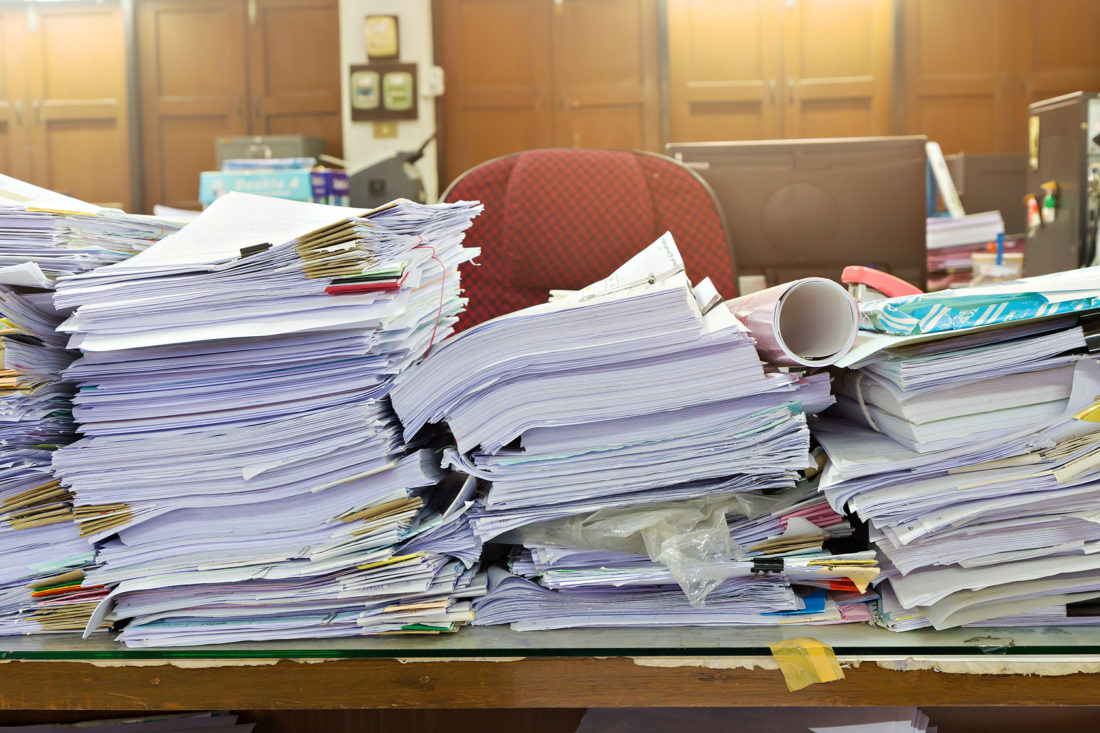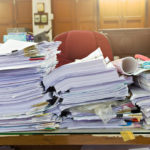I’ve been in a lot of lawyer’s offices and have seen a lot of messy desks.
I’m not very judgmental about them because I understand there’s often a method behind some of the madness and I’m also a fellow traveler/sufferer/practitioner.
Now don’t get me wrong. Almost all my office processes are paperless and have been for a long time. But paperless means what it says; otherwise we would call it paper-free.
But back to the lawyer with files piled on his or her desk. The method to that madness is often that the lawyer has deadlines or active projects on each of those client files. They wouldn’t necessarily admit it, but they keep those files on their desk both for convenience to quickly get to the file and as a reminder that the work needs to be done. There is a fear of putting it out of sight and missing the deadline. While it may be somewhat stress-inducing, the file sitting on your desk when there is brief due in four days can be motivating. A fellow traveler knows.
When there are others in the office also working on that file, it is an inconvenience to them when it is absent from its proper place in the file drawer. Of course, if they have worked with you long enough, they may stop at your desk first before they even check the file drawer.
There are, of course, better ways to do this. One should work from organized “to do” lists rather than files. And almost every lawyer today should use practice management software tools to have digital client files rather than paper client files. The physical files, if they exist, should stay in the filing cabinet as a backup or for when the lawyer needs to take them to court appearances.
But today I’m talking about messy desks. Many lawyers take great comfort in research that suggests a messy desk could be a sign of being a genius. But there are many other studies that suggest a messy desk is psychologically stressful and, as anyone who has spent several minutes digging through their desk trying to find something knows, a messy desk can negatively impact productivity. I’ll also note that credenzas may be one of the single worst inventions for good office organization.
For lawyers, there’s another important downside to having a messy desk because some clients may be hesitant to hire a lawyer who appears disorganized. For some it may be a sign that they actually are disorganized. If a very organized client does not retain your firm, it is a double loss because we all know that it’s much more positive to represent organized clients than disorganized clients. There are many ways to improve disorganization, including obtaining professional help or listening to helpful podcasts.
My personal messy desk challenge is a little different since I do not represent clients and have no client files. I frequently have law-related magazines open to articles when I was interrupted before I finished reading. I sometimes have paperwork that I will need for a meeting in a day or two and then need not retain afterwards. When I’m working on a project sometimes there are paper components that can and should be on my desk until the project is finished. I still frequently take notes by hand and so I may have a legal pad or two on my desk with nonessential notes. (I am good about digitally filing essential notes.)
Matters related to client files need to be filed in the client file and that is a high priority for lawyers.
But I often have items on my desk that are there because they may be useful in the future and yet do not fit into my filing system.
So let’s talk about things that appear to be worthy of saving and don’t have a place to be saved. One of the most important tools that a lawyer can have is a scanner within arm’s reach. For about 20 years now I’ve always had a Fujitsu ScanSnap within arm’s reach. My current model is the ScanSnap iX 1500. If something is worthy of being retained for future use, it is worthy of being scanned and that includes hand-written notes. So, if you don’t have a place for something in your filing system, the wisdom I’m sharing today is to create a place.
Before you clean up your messy desk for the 100th time or have your assistant help you do so, take inventory of what’s there and why. If there are papers for a civic or professional organization you’re involved with, then create a folder on your network for those papers (or a physical file folder if that is required.). But don’t create too many folders as they will become a barrier to scanning and filing documents. In fact, I’ll give you an out. Create a folder called My Desk August 2019 or MyDesk 8.2019. That’s certainly not the optimal solution for many and professional organizers might laugh at the suggestion. But if you’re scanning documents to text searchable PDFs you can probably search for them and locate them on your network or computer. And dating those folder names can be useful when you’re certain you had it on your desk “just a few weeks ago.”
Whatever your personal “messy desk” improvement is, it should be something that will work for you. But it is pretty unlikely clients or potential clients who are visiting your office will look at a terribly disorganized desk and think “Wow, my lawyer has got to be a genius. I’m certain he’s got everything in my case under control.”
Go to Source
Author: Jim Calloway


